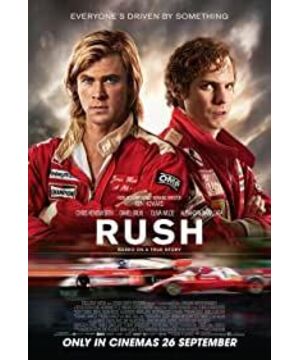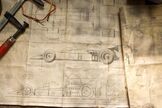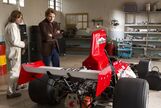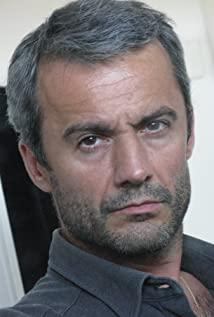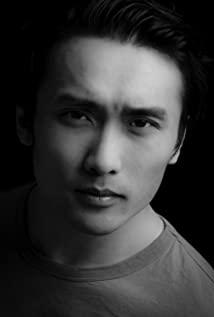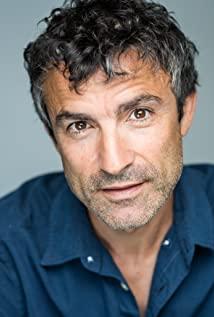The film selects the racing stories of two of the most legendary figures in the F1 industry in the 1970s and 1980s, Niki Lauda and James Hunt. But looking at the history of F1, there are too many subjects to be photographed. It is also the grudge between the two drivers. The story of Ayrton Senna and Aaron Pauls may be more exciting. In "Senna Forever", the story of the two of them finally reconciling from friend to enemy looks even more heart-warming. Director Ron Howard must have been well aware of this in the choice of subject matter, so "Fast Love" does not intend to show the grievances and gossip of the two drivers, but focuses on the character contrast of these two extreme personalities in the competition , and how their personalities create their contradictions and influence each other.
Niki Lauda can be described as an academic emperor in the racing world. His talent for shunting and his stable character during racing have made him the king of the F1 world. And this Austrian, who is known for his extremely rigorous character, must be greatly reduced in terms of entertainment, so people at that time preferred James Hunter. In Lauda's view, life has no passion but only rules. The same is true of racing cars. His views on racing cars may disappoint many fans. In the film, he had an argument with his fellow Ferrari teammate Regazzoni. Regazzoni believes that "our business is passion and love, so We are willing to give our lives for it." And Lauda thought, "If I think I have other skills and can do other things to make more money, I will not drive... This is business." Although Lauda did not inherit his The family business, but inherited his family character. Rigorous style, unsmiling personality, this is in great contrast with the traditional concept of racing drivers. Lauda's father believes that "racing is for playboys and half-hearted artists, and people who are idle and have nothing in their minds." Lauda This surname should be that of politicians and economists." Lauda should not have let his family down, he brought the family's rigorous style to racing, treating his racing career as a business. In the film, we see him spending money to get from F3 to F1 and haggling with his boss. Hunter couldn't do such a thing. Lauda's girlfriend also believes that "not all F1 drivers have long hair, very sexy, shirt buttons are open, and he drives like an old man." And Niki's answer is pragmatic and utilitarian "There is no need to drive fast now, This will only increase the risk, we are not in a hurry, no one is giving me money, and now there is no incentive or reward, why drive fast"
Lauda's sanity has almost made the sport of F1 lifeless, and he will even die Probability quantification, at the Nürburgring in Germany in 1976, Lauda proposed at a pre-race drivers meeting to cancel the race because the track was too dangerous and it was raining again. "Every time I get into my car, I have a 20% chance of dying. I can accept that, but I can't get 1% more. The risk is even higher when it rains today." The difference is that he is on the court to kill you, "Isn't that what we play for? Looking directly into the eyes of the god of death and escaping his clutches, it feels like becoming a knight." He believes that quantifying death "kills this." The beauty of sports."
These are two very different people in terms of life attitude. Lauda's daily life is "go to bed early, take care of yourself, take care of my car... come to work, win the race, and when the work is over, I'll go home." The rules of life are smooth, there is no fun, and after Lauda gets married, he is even afraid of perfect happiness. "Happiness is the enemy. It makes you weak, makes you doubt, and suddenly there is something you can't let go." It's two extremes with Hunter, who is currently drunk and drunk. In Regazzoni's words, he commented on Hunter, "He became famous for two things: he went to the track to die, and he went to bed day and night after leaving the track. He was not bad as a driver, but he was obviously a perpetual motion machine in bed. "Sex is the breakfast of champions," emblazoned on Hunter's uniform. He is rumored to have slept with more than 5,000 women, and at the Tokyo Hilton in 1976, he hosted 33 flight attendants over a two-week period. . So Lauda wasn't surprised when Hunt died of a heart attack at the age of 45.
It is such two extreme men, the possibility of becoming friends is almost zero, one is rational and the other is emotional, the other is arrogant and the other is prejudiced. But they are also influenced by each other's character. Hunter also tried his best to change his life in order to win Lauda. Although his efforts did not seem successful, in a certain way, he admired Lauda's personality. When Lauda suffered severe burns at the Nurburgring, he felt deeply guilty, and when Lauda endured severe illness and resolutely raced 42 days later, the wild Hunter could only deeply admire, because he knew , there are things he can't do that Lauda can. And Lauda is actually envious and jealous of Hent's life. He knows that this person who "takes every day as the last day" is also an attitude to life, and his life is lacking this kind of passion. As Lauda's wife said to him, "When you make happiness your enemy, it's too late, you've already lost." The excellence of the two came from their extreme personalities, and what was lacking in their lives Personality comes from your opponent. Lauda's role is to make Hunter work harder so that he can beat this opponent, and when Lauda struggled to the death and finally returned to the game, it was also because of Hunter. It can be said that the success of both of them comes from the strength of their opponents, and the same is true in life.
So Lauda finally said, "Don't take the enemy in your life as a curse. This is also a gift from God. The wise learn more from enemies than fools learn from friends." It is the process that they gradually changed from mutual hostility to mutual respect and finally mutual appreciation.
View more about Rush reviews


